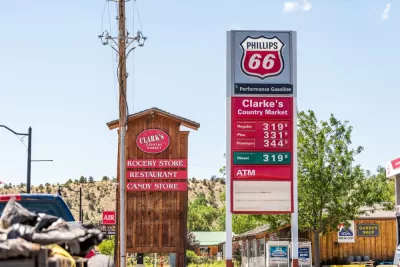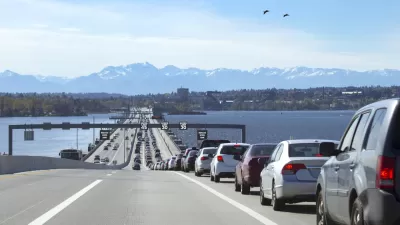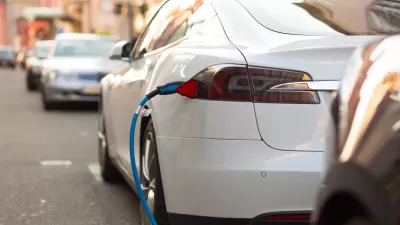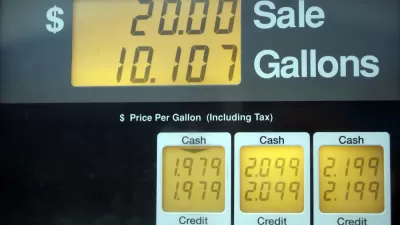The state auditor and the transportation chief argue that the gas tax is an unsustainable funding source caused by a projected increase in electric vehicle adoption and an increase in fuel efficiency of gas-powered vehicles.

The State Auditor's office released [pdf] a six-page "visual analysis [pdf]" on Feb. 26 that illustrates that gas tax revenue is not keeping up with increases in population and driving.
Utahns consume more fuel, but with greater fuel efficiency. As a result, motor fuel taxes continue to fund a smaller and smaller share of state transportation spending.
While transportation spending has increased, the graph on page five explains that it was due to "sales tax earmarks." The last graph is titled, "Periodic gas tax increases are not working."
Planetizen covered the 2015 gas tax legislation that hiked the gas tax by almost a nickel on Jan.1, 2016, and then converted it to a wholesale fuels sales tax.
“The gas tax is slowly dying," said State Auditor John Dougall [pdf].
With more fuel-efficient cars and the migration to alternative-fuel vehicles, the drivers’ funding of the transportation system is weakening. The motor fuel tax no longer appears to be an effective long-term means of paying for roads and bridges. Over the next few years, Utahns need to identify how best to fund the highway infrastructure they expect.”
Road usage charge as the replacement for gas tax
However, the State Auditor's Office press release doesn't indicate what the alternative revenue method should be, unlike Carlos M. Braceras, the director of the Utah Department of Transportation (UDOT), who "predicted [in January] that the gas tax will be replaced eventually by charging car owners for every mile they drive and by imposing more tolls." writes Lee Davidson of The Salt Lake Tribune (in source article).
“This is the future way,” Braceras said. “We’re going to fund [transportation] based on how much of the services you use.”
The future began on Jan. 1 for the state's 51,000 battery-electric, plug-in hybrid, and conventional hybrid vehicles who were given the opportunity to enroll in the Utah Road Usage Charge (RUC) program, making the Beehive State second only to Oregon to operate a program that charges participants for each mile they drive. Other states, including Colorado, Washington, California, and soon Hawaii, have operated road usage charge pilot programs where no revenue was collected.
Why enroll?
Like the Oregon program, OReGO, participation for alternative-fueled vehicles is voluntary, but owners have an incentive to enroll due to registration fees that apply only to these vehicles, which include conventional hybrids, resulting from 2018 legislation that was meant to ensure that all motor vehicles pay their fair share of road taxes.
This year, owners of battery-only and plug-in hybrid electric vehicles must pay a $90 or $39 annual alternative fuel registration fee, respectively, and "gasoline hybrid" owners pay a $15 fee. And those fees increase next year – see UDOT Annual Registration Flat Fee Schedule for alternative fuel vehicles.
Motorists who enroll in Utah's RUC program will not be charged the registration fee. Instead, they'll pay 1.5 cents for every mile they drive, but the total charge for the year will not exceed the annual fee for that vehicle, which can be viewed as an incentive to drive fewer miles.
Braceras said lessons learned through that voluntary program could someday help expand it to all drivers to help replace or supplement gasoline taxes.
When is 'someday'?
The calls, particularly from state departments of transportation and others familiar with the problem of stagnant gas taxes, to transition to a mileage fee are not new. Indeed, at the base of the source Salt Lake Tribune article is a 'clarification:' "John Dougall says he's been talking since 2003 about problems with the gas tax..."
Washington state has answers
Even if there is political will to implement a mileage fee, the transition away from state gas taxes would not be swift, according to the Washington State Road Usage Charge Assessment Final Report which was transmitted by the Washington State Transportation Commission (WSTC) to the Gov. Jay Inslee, the state legislature and the Federal Highway Administration in January. From Volume 1, pg. 15 [pdf]:
While a transition period may require 10 or more years, a gradual introduction of a RUC will allow continued improvements in mileage reporting systems while reducing potential adverse financial impacts to the state that could result from transitioning too quickly.
The report recommends the UDOT approach – beginning as early as possible with alternative fueled vehicles, plus state agency vehicles. The commission recommends "a period of 10 to 25 years to complete a full transition from the gas tax to a RUC system."
Hike fuel taxes?
As for hiking fuel taxes, the commissioners felt that would result in "an increasing proportion of public roadway system costs [to] fall on a smaller number of people who drive average or below-average MPG vehicles," which would "disproportionately impact drivers with moderate and lower incomes with limited ability to purchase new, high-MPG, or electric vehicles." [pg. 9. Volume 1].
Washington's 49.4 cents per gallon state gas tax is the nation's fourth-highest state after California, Pennsylvania, and Illinois, according to the American Petroleum Institute. However, it is not indexed for inflation. Utah's state gas tax of 31.11 cents is a nickel lower than the nation's average, though it is indexed for inflation.
The three-volume Washington state RUC report is recommended reading for anyone interested in mileage fees as a replacement or supplement to gas taxes.
- The Slow Transition from Gas Taxes to Mileage Fees, January 17, 2018
-
An Unexpected Advocate for Utah's Vehicle-Miles-Traveled Fee, July 25, 2015
-
Utah on Verge of Hiking Gas Tax by 21 Percent, March 16, 2015
FULL STORY: Utah state auditor says ‘gas tax is slowly dying’

Planetizen Federal Action Tracker
A weekly monitor of how Trump’s orders and actions are impacting planners and planning in America.

Maui's Vacation Rental Debate Turns Ugly
Verbal attacks, misinformation campaigns and fistfights plague a high-stakes debate to convert thousands of vacation rentals into long-term housing.

San Francisco Suspends Traffic Calming Amidst Record Deaths
Citing “a challenging fiscal landscape,” the city will cease the program on the heels of 42 traffic deaths, including 24 pedestrians.

Amtrak Rolls Out New Orleans to Alabama “Mardi Gras” Train
The new service will operate morning and evening departures between Mobile and New Orleans.

The Subversive Car-Free Guide to Trump's Great American Road Trip
Car-free ways to access Chicagoland’s best tourist attractions.

San Antonio and Austin are Fusing Into one Massive Megaregion
The region spanning the two central Texas cities is growing fast, posing challenges for local infrastructure and water supplies.
Urban Design for Planners 1: Software Tools
This six-course series explores essential urban design concepts using open source software and equips planners with the tools they need to participate fully in the urban design process.
Planning for Universal Design
Learn the tools for implementing Universal Design in planning regulations.
Heyer Gruel & Associates PA
JM Goldson LLC
Custer County Colorado
City of Camden Redevelopment Agency
City of Astoria
Transportation Research & Education Center (TREC) at Portland State University
Jefferson Parish Government
Camden Redevelopment Agency
City of Claremont





























